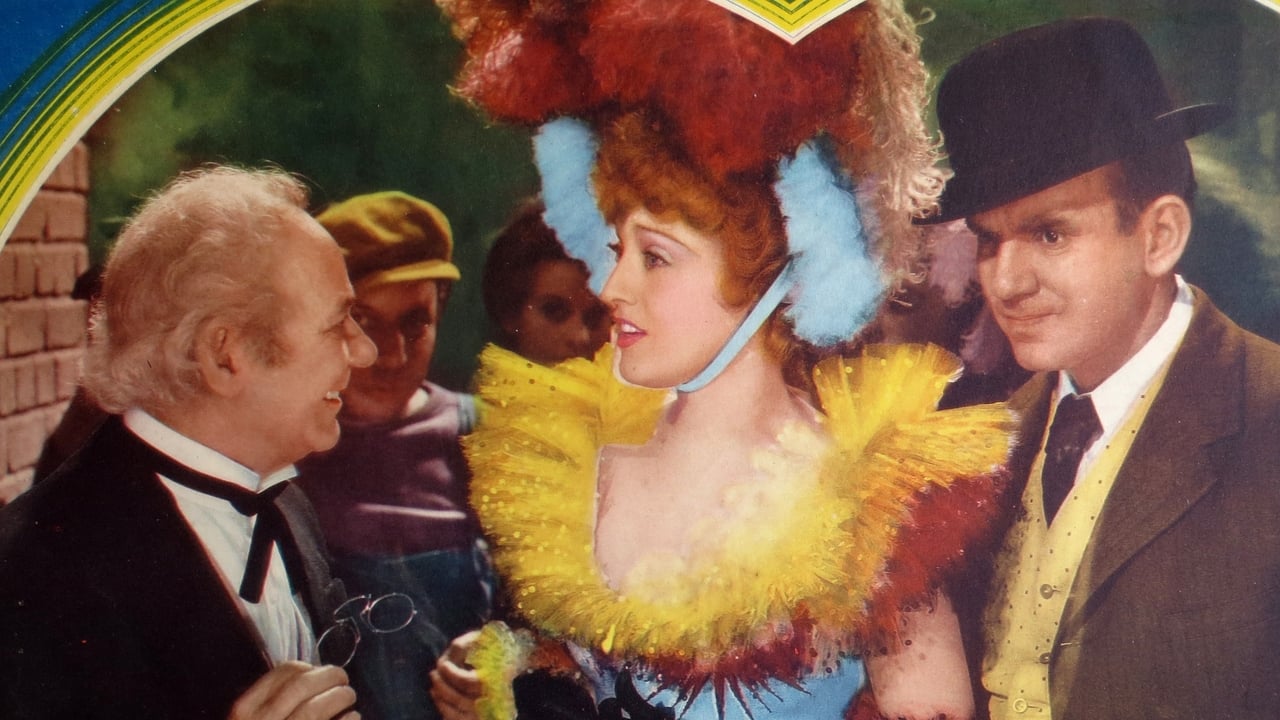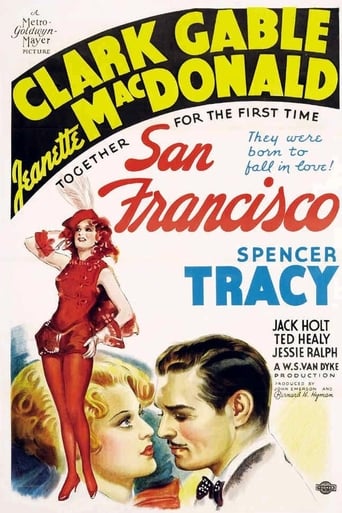

No doubt about it - this is one of Hollywood's greatest films. Well written, acted, directed and edited, it is a love story set against the events leading up to the 1906 earthquake, both political and economical.The resulting fire that really destroyed the city after the earthquake (due to broken water mains making it impossible to resource water) is made the focus of the last half hour (the first quake occurs at 1:33:30 into the film and the aftershock occurs at 1:38:15).Only four of MacDonald's films were nominated for best picture Oscars and this was the most deserving of them all.Gable and MacDonald are a sensational team - what tremendous chemistry they had and what a pity they never made another film together. Though I don't begrudge Tracy his first Best Actor nom as the priest, Father Mullin, he really deserved a supporting nod, not a leading one. That belonged to Gable, giving a lusty and thoughtful performance as a man who must change his character during the course of the action. He is truly the star of the film. His and MacDonald's love scene in his office where he recognizes she is afraid of the woman inside of herself is one of film's most subtle and beautifully handled.A nod to Jessie Ralph for her heart-breaking cameo as Maisie Burley.The only negatives are the excessively long excerpts from Gounod's FAUST (part of Miss MacDonald's contract to have as much opera to sing in her films as possible, even changing characters such as backwoods tomboy Rose Marie into an established opera star in the film of that name) and the stupid cheerful march to view the ruined city singing away at the end.Also a writing faux pas- when Gable asks MacDonald how long this opera stuff has been around she answers 150 years. Wrong by that amount of time as well - opera began around 1600, making that 300 years at the early 1906 date the question was asked.Let's not quibble though. The special effects were so great the category was established that next year at the Oscars. This deservedly won for Sound but for my money deserved another Oscar for Editing. Still the six noms it got can't be denied.It endures however and is a great example of Hollywood at its finest.
... View MoreAt the time, this was probably seen as a blockbuster and moved many. It is too ordinary to recommend now. It has nice, clean drama. It has character conflict, sure. Gable stands in for ragged individualism and the American spirit of pulling yourself up from your bootstraps. Jeanette Macdonald stands in for unspoiled grace (what an amazing presence she was; exuding erotic magnetism in The Merry Widow, here she is dovelike and tender). Tracy's priest character acts as conscience.It is just so clean. Macdonald is not just the girl we see, she has to be a pastor's daughter and an orphan to emphasize her angelic purity, textbook stuff. The conflict up on the stage, since this is a musical, is that she's poor has to sing jazz tunes for Gable's music joint to get by, but her real talent is in opera, seen in this context as a higher form of expression. See?The one part that is interesting is that it all culminates with the San Francisco earthquake of 1906.The footage of destruction still impress on a visual level. There is scope here you wouldn't normally see in those days. But destruction like that—and Chicago's twenty years before—was a major force in shaping the face of modern America, doing away with the rubble of history, so the context matters.It ends with Macdonald singing among ruins and Gable in tears finally receiving god. (a scene that embarrassed this Hemingway man and his image)No dice. It is too Protestant to register for this viewer.But there is one notion that strikes some spark—a justifiably angry Gable has just hurt his former star in public for what seems like the last time, the rift between them for good, and this is answered the next moment by the ear-splitting roar of the earthquake and walls being ripped apart. Alas, in the film this is squandered in treacly lesson- learning.
... View MoreOn 31 December 1905, a fire destroys a building at Barbary Coast in San Francisco and on the next day, the singer Mary Blake (Jeanette MacDonald) from Benson, Colorado, that lived in the burnt building looks for a job at the nightclub Paradise. The owner Blackie Norton (Clark Gable) is a ruthless but good man and hires Mary after asking her to show her legs. Blackie is also invited to run to the position of Supervisor of the Coast by his friends and acquaintances to protect the neighborhood.When Blackie's competitor from Nob Hill, Jack Burley (Jack Holt), and his friend Maestro Baldini (William Ricciardi), hear Mary singing, Jack invites her to sing at his fancy Tivoli Opera House. However, Mary has a two-year contract signed with Blackie and is in love with him. But when the other artists from Paradise see her with Blackie and make malicious comments about her, she quits and goes to Tivoli. On her debut at the Tivoli, Blackie goes there with an authority to call off the concert. Blackie has an injunction against Jack Burley since Mary is still under contract with him. However, when he hears Mary singing the opera, he changes his mind and proposes her to get married with him. Mary returns to the Paradise but when Blackie's friend Father Tim Mullin (Spencer Tracy) sees Mary exposing her legs, he does not allow her to go to the stage. Mary works at Tivoli and is proposed by Jack Burley to marry him. Meanwhile the powerful Jack Burley uses his influence with the Powers that Be to close the Paradise and arrest the performers. During a musical competition between the clubs, Mary Blake learns the truth and decides to help the Paradise with her presentation. However, it is 1906, the year of the major earthquake that struck San Francisco. "San Francisco" is a wonderful film of love and earthquake in the sin city. I had no idea that this film was so good and this is the first time that I watch "San Francisco". The story is excellent, with charismatic and ambiguous characters, enjoyable songs sang by Jeanette MacDonald and stunning special effects, with a realistic and convincing earthquake. The very last scene is fantastic.Clark Gable and Jeanette MacDonald show a magnificent chemistry and it is impressive the resemblance of the face of Madonna in the 80's with Jeanette MacDonald. I only regret that I had not seen this film before. My vote is eight.Title (Brazil): "San Francisco – A Cidade do Pecado" ("San Francisco" – The Sin City")
... View MoreThis movie focuses on romantic entanglements on the Barbary Coast, culminating with the San Francisco earthquake of 1906. Until the earthquake comes, the film is mostly an excuse for MacDonald to sing, and she starts warbling every chance she gets. Between songs there is some rather uninteresting soap opera as Gable and Holt battle for Jeanette's singing contract as well as her affections. The earthquake finally comes after Jeanette has sung about her 43rd song, but the old gal has one more tune left in her even after the quake, when the film turns quite corny. The special effects are not bad for their time, but look lame compared to today's CGI capabilities.
... View More